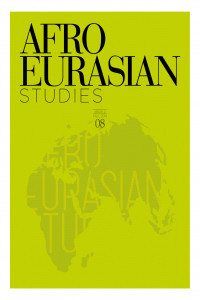Inventory of the Islamic Economics and Finance Studies Carried Out in Turkey and Its Evaluation
Inventory of the Islamic Economics and Finance Studies Carried Out in Turkey and Its Evaluation
Islamic Economy, Turkish Studies on Islamic Finance, Islamic Finance Turkish Studies on Islamic Economy, Academic Studies on Islamic Economy and Finance,
___
- Acar, M. (2003). İslam İktisadının Başlıca Sorunları. İslami Araştırmalar Dergisi(4), 540-546.Atar, A. (2017a). Başlangıcından Günümüze Dünyada ve Türkiye'de İslami Bankacılığın Genel Durumu. Tarik Kültür ve Sanat Araştırmaları Dergisi, 1029-1062.Atar, A. (2017b). İslami İnanç Sisteminde Finansal Yapı ve Faize Bakış. İ. Eroğlu, Y. Temür, & S. Kekevi (Dü) içinde, İslami Perpektifte İktisadi Yaklaşımlar (s. 189-214). Bursa: Ekin Basım Yayın Dağıtım.Büyüker, K. (2010). İslam iktisadı ve İş Ahlakı Kitaplığı. Din ve Hayat Dergisi, 112-116.Can, Y. (2012). İktisatta Psikolojik İnsan Faktörü: Davranışsal İktisat. Hukuk ve İktisat Araştırmaları Dergisi(2), 91-97.Chapra, M. U. (2017). İslam Ekonomisi Nedir ve Nasıl Gelişmiştir. İslam Ekonomisi Düşüncesi: Birikim ve Yönelim, 97-131. (S. Karadoğan, Çev., & R. Abdullahoğlu, Derleyici) İstanbul: Maruf Eğitim Araştırma ve Dayanışma Vakfı.Chapra, M. U., & Ayengin, T. (2003). İslam Ekonomi Bilimine İhtiyaç Var mı? Din Bilimleri Akademik Araştırma Dergisi(1), 169-191.Ersoy, A. (2008). İktisadi Teoriler ve Düşünceler Tarihi. Ankara: Nobel Yayın.Eskicioğlu, O. (1999). İslam ve Ekonomi. İzmir: Çağlayan Matbaası.Eskicioğlu, O. (2010a). Kuran'a Göre İslam Düzeni ve Ekonomik Esaslar. Aralık 2017, 21 tarihinde http://www.enfal.de/kuran_esaslar.pdf adresinden alındıEskicioğlu, O. (2010b). İslam’da Ekonomik Sistem. İslam Hukuku Araştırmaları Dergisi(16), 35-46.Gürdoğan, N. (2004). İslam Ekonomisi Metodolojisi Müzakereler. İ. Kurt, & S. A. Tüz (Dü.), İslami İlimlerde Metodoloji/Usul Meseleleri II. içinde İstanbul: İSAV Yayınları.Karaoğlu, Ö. (2017, Mart 6). Doç. Dr. Ömer Karaoğlu İle Müzik ve İktisat Üzerine Röportaj.Kazgan, G. (2014). İktisadi Düşünce veya Politik İktisadın Evrimi. İstanbul: Remzi Kitabevi.Kurmuş, O. (2009). Bir Bilim Olarak İktisat Tarihinin Doğuşu. İstanbul: Yordam Kitap.Özkiraz, A. (2017). Sabrı F. Ülgener'de Zihniyet ve Geri Kalmışlık: Osmanlı'dan Günümüze Yapısal Bir Çözümleme. İstanbul Üniversitesi Siyasal Bilgiler Fakültesi Dergisi, 35-59.Tabakoğlu, A. (1979). İslam İktisadına Giriş. İstanbul: Dergah Yayıları.Tabakoğlu, A. (1996). İslam ve Ekonomik Hayat. Ankara: Diyanet İşleri Başkanlığı Yayınları.Tabakoğlu, A. (2004). İslam İktisadı Metodolojisi. İ. Kurt, & S. A. Tüz (Dü.), İslami İlimlerde Metodoloji/Usul Meseleleri II. içinde İstanbul: İSAV Yayınları.Tabakoğlu, A. (2008). İslam İktisadına Giriş (2. Baskı b.). İstanbul: Dergah Yayınları.Tabakoğlu, A. (2010). Bir İlim Olarak İslam İktisadı. İslam Hukuku Araştırmaları Dergisi(16), 11-34.Weitzman, M. L. (1985). The Simple Macroeconomics of Profit Sharing. The American Economic Review, 937-953.Zaim, S. (2004). İslam İktisadında Metodoloji Müzakereleri. İslami İlimlerde Metodoloji/Usul Meseleleri II. İstanbul: İSAV Yayınları.Zaim, S. (2014). İslam Ekonomisinin Temelleri. (A. Esen, T. Koç, & M. Y. Çakır, Dü) İstanbul: Dünya Yayıncılık.
- ISSN: 2147-110X
- Yayın Aralığı: Yıllık
- Başlangıç: 2012
- Yayıncı: Musiad (Independent Industrialists and Businessmen's Association)
Economic and Commercial Relations of the Prophet Muhammad with the Jews
Mustafa YİĞİTOĞLU, Mustafa GÖREGEN
Asylum Seeker and Refugee Crisis as a Humanitarian Tragedy in the Contemporary World
Zihniye OKRAY, Sultan OKUMUŞOĞLU, Cemaliye DİREKTÖR, Anjelika HÜSEYİNZADE ŞİMŞEK
Inventory of the Islamic Economics and Finance Studies Carried Out in Turkey and Its Evaluation
